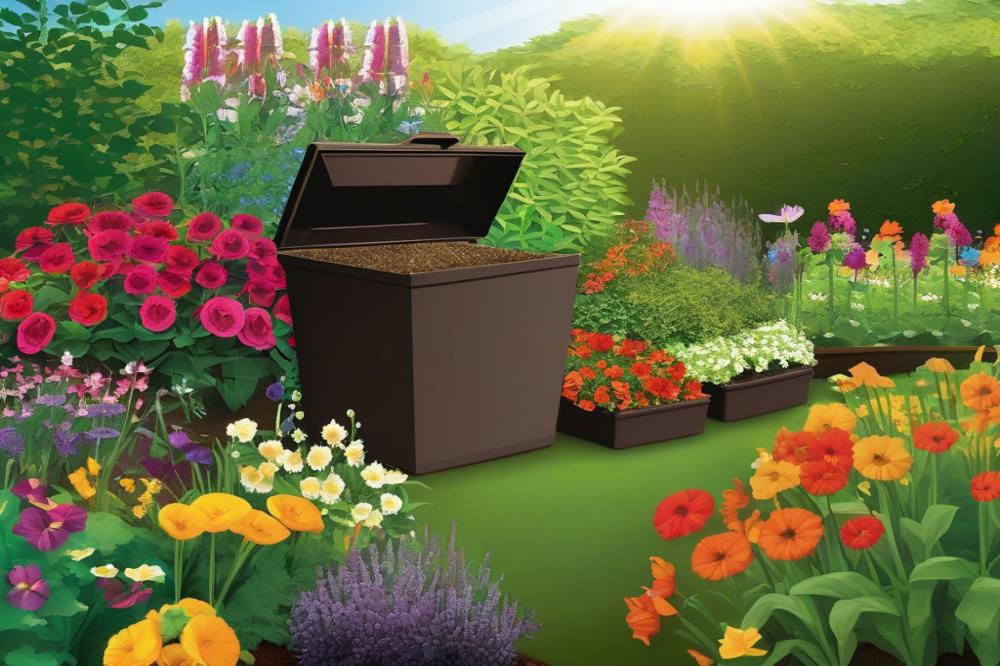The Role of Compost as a fertilizing-acid-loving-plants-like-rhododendrons-and-azaleas”>Natural Fertilizer
Compost represents a natural solution for enhancing soil health. It is created through the breakdown of organic matter, such as food scraps and yard waste. This process transforms these materials into a rich, fertile substance that supports the growth of plants. Understanding this process is crucial for anyone interested in gardening.
Gardening can benefit immensely from the use of compost. Applying it to your garden not only improves soil structure but also boosts its ability to retain moisture. Plants thrive in this nutrient-rich environment, leading to vibrant and healthy growth. By using compost, gardeners can foster strong root systems and promote bountiful yields. This makes it an essential component of sustainable gardening practices.
Exploring the environmental benefits reveals even more reasons to embrace composting. Healthy soil teems with microorganisms that play a vital role in breaking down organic matter. These tiny creatures help recycle nutrients, creating a living ecosystem within the garden. Without them, soil would struggle to support plant life. Thus, utilizing compost serves a dual purpose: nurturing plants and protecting the environment.
Incorporating this fertilizing-acid-loving-plants-like-rhododendrons-and-azaleas”>Natural Fertilizer can also simplify garden maintenance. By enriching the soil, compost reduces the need for chemical fertilizers, which can be harmful to our surroundings. An eco-friendly approach often leads to greater biodiversity. As more people turn toward sustainable methods, composting stands out as a practical solution for conscientious gardeners.
Ultimately, the value of compost goes beyond improving soil. It connects individuals to nature while fostering a healthier environment. By embracing the composting process, gardeners actively contribute to a more sustainable future for agriculture. Keeping these benefits in mind, the importance of this organic matter becomes clear.
What is Compost?


Compost is made from organic waste materials that break down over time. It serves as a natural fertilizer rich in nutrients. This rich substance enhances soil health and boosts plant growth. Composting is an effective method for recycling kitchen scraps, leaves, and grass clippings.
Explanation of Composting Process
The composting process involves several steps. First, organic materials are collected and piled together. Microorganisms, including bacteria and fungi, start breaking down these materials. Oxygen is vital, so turning the pile occasionally helps aerate it. As decomposition occurs, microorganisms feed on the organic matter, resulting in a dark, crumbly substance.
Temperature plays an important role too. The pile heats up, which helps kill harmful pathogens and weed seeds. Over a few months, the materials transform into fertile compost, ready to nourish the soil.
Types of Compost
Many types of compost exist, each serving different purposes. Hot compost involves a mix of green and brown materials. This type generates heat quickly and decomposes faster. Cold compost, on the other hand, takes a slower approach. With less active management, it requires more time for breakdown.
Another method is trench composting, where organic matter is buried in soil. This technique is beneficial for garden maintenance and soil enrichment. Worm composting is also popular. Using worms to break down organic scraps creates nutrient-rich fertilizer.
Comparison Between Compost and Synthetic Fertilizers
Compost offers several advantages over synthetic fertilizers. While synthetic options quickly provide nutrients, they can also harm soil microorganisms. These chemical fertilizers often lead to nutrient runoff, causing environmental issues. In contrast, compost supports soil health by enhancing organic matter naturally.
Using compost promotes eco-friendly agriculture and sustainable gardening practices. Nutrient-rich compost improves soil structure, allowing for better water retention. This benefit aids plants during dry spells, leading to healthier growth. Ultimately, choosing compost contributes to a greener planet while nurturing the garden.
Nutrient-Rich Composition


Key nutrients in compost
Nutrients are vital for the growth of plants. Important components include nitrogen, phosphorus, and potassium. These three elements support various functions in plants. Nitrogen promotes leafy growth, while phosphorus aids in root development. Potassium plays a role in overall plant health and disease resistance. When made properly, compost offers a balanced mix of these essential nutrients. This results in robust plants that can thrive in gardens or farms.
Understanding organic matter and its benefits
Organic matter comes from decomposed plants and animals. It enriches the soil by improving its structure. Healthy soil holds moisture better and prevents erosion. Moreover, it provides habitat for soil microorganisms. These tiny organisms are crucial for breaking down nutrients, making them available for plants. In addition, organic matter enhances the nutrient retention of soil. Therefore, using compost is a natural way to boost this important component of soil.
How compost enhances soil health through nutrient availability
The relationship between compost and soil health is significant. As compost breaks down, it releases nutrients into the soil. This process makes nutrients more accessible to plant roots. Healthy soil also promotes the activity of beneficial microorganisms. These microorganisms help decompose organic materials, further increasing nutrient availability. Engaging in sustainable gardening practices, like incorporating compost, can have lasting environmental benefits. Regular garden maintenance becomes easier as healthier soil supports stronger plants with less need for chemical fertilizers. Eco-friendly agriculture can flourish when nutrient-rich materials are used to enhance soil health naturally.
Benefits of Compost for Soil Health


Healthy soil is the foundation of a thriving garden. One significant advantage of adding organic material is its positive impact on soil structure. When you enrich soil, it becomes crumbly and loose. This change allows for better aeration. Oxygen reaches the roots more easily, promoting stronger plant growth. A well-aerated environment reduces compaction, making it easier for roots to expand freely.
Moisture retention is another critical benefit. Soil rich in organic matter holds water more effectively. This capacity means that plants receive consistent hydration, even in dry conditions. Consequently, gardeners can reduce the frequency of watering. Less frequent watering not only saves time but also lowers water usage. This aspect aligns perfectly with sustainable gardening practices.
Support for soil microorganisms is crucial for plant health. Various tiny life forms thrive in nutrient-rich environments. They break down organic materials, releasing essential nutrients back into the soil. Their activities enhance overall nutrient availability for plants. An active community of microorganisms can lead to increased resilience against pests and diseases. This improves the health of plants, making them thrive in the environment.
Maintaining a garden with compost creates a cycle of benefits. Healthier soil leads to improved plant vitality, leading to greater yields. Eco-friendly agriculture relies heavily on these natural processes. The composting process not only enriches the garden but also contributes to a healthier ecosystem. Thus, enjoying these advantages encourages many to choose composting for their gardens.
Compost and Sustainable Gardening


Integration of Compost in Eco-Friendly Agriculture
Using compost is a smart choice for anyone interested in sustainable gardening. This natural fertilizer enriches the soil with organic matter. It provides a plethora of nutrients vital for plant growth. Many gardeners are now recognizing its importance. Farmers are also adopting these eco-friendly practices. By returning nutrients to the soil, they enhance its fertility. This leads to a healthier agricultural system. The composting process not only benefits individual gardens but also supports larger ecosystems.
Long-Term Benefits of Compost for Garden Maintenance
Garden maintenance becomes simpler when compost is part of the plan. Over time, it significantly improves soil health. With each application, soil microorganisms thrive. These tiny helpers break down organic materials, making nutrients available to plants. As a result, plants are more robust and resilient. Gardens that utilize compost typically require less water and fewer synthetic fertilizers. This practice fosters a more sustainable approach to gardening, ultimately leading to less environmental impact.
How Compost Contributes to Ecosystem Health
Healthy ecosystems depend on a balanced cycle of nutrients. Organic materials, broken down through composting, release essential nutrients back into the soil. This process supports plant growth, but it does more than that. Healthy plants, in turn, support insects, birds, and other wildlife. Using compost reduces the need for chemical fertilizers, which can harm soil and water systems. Thus, gardeners play a crucial role in promoting environmental benefits through their composting efforts. The ripple effect of their actions contributes to the health of the planet.
Environmental Benefits of Composting
The composting process offers significant advantages to our environment. One major benefit lies in the reduction of waste that ends up in landfills. Organic materials, such as kitchen scraps and yard waste, can be transformed into valuable resources. This practice not only minimizes landfill overflow but also lowers methane emissions, which contribute to climate change.
Another important aspect involves a decrease in reliance on synthetic fertilizers. For many gardeners, using nutrient-rich compost provides a natural alternative that promotes soil health. Chemicals found in conventional fertilizers can lead to runoff, causing pollution in nearby water sources. By relying on organic matter, gardeners support the ecosystem while maintaining effective plant growth.
Additionally, composting plays a vital role in carbon sequestration. When organic waste is broken down, it captures carbon from the atmosphere and stores it in the soil. Healthy soils rich in organic matter enhance the habitat for soil microorganisms. These beneficial organisms improve soil structure and enhance nutrient availability, further promoting sustainable gardening practices.
Investing in this eco-friendly agriculture approach helps create thriving ecosystems. Garden maintenance becomes easier and more productive when natural amendments are used. By integrating compost into gardening, one contributes positively to the environment at large.
Implementing Compost in Gardening Practices
Techniques for Creating and Using Compost
In gardens, creating compost starts with gathering organic materials. Fruit and vegetable scraps work well along with dried leaves and grass clippings. Kitchen waste, such as coffee grounds and eggshells, contributes valuable nutrients. Layering these items ensures airflow and hastens the decomposition process. Incorporate some brown materials, like shredded paper or straw, to balance moisture. Regular turning of the pile helps speed up breakdown while allowing oxygen to reach the layers.
Using compost in your garden is simple. After it matures, spread it over the soil as a top dressing. This method enhances soil health and enriches the land. Alternatively, mix it directly into planting beds to increase organic matter and aid plant growth. Many gardeners also use it in potting mixes for container plants. The resulting mix boosts their nutrient content, creating a thriving environment for growth.
Best Practices for Maintaining Compost Quality
Maintaining the right conditions is crucial. Moisture levels need to be optimal; compost should feel like a damp sponge. Too dry, and decomposition slows down; too wet, and it can smell bad. Monitoring temperature can also be helpful. A balance in layers helps maintain heat, encouraging beneficial soil microorganisms.
Regularly checking for pests is important. Keep an eye out for any unwanted critters that may disrupt the composting process. By managing these elements, one can ensure a healthy, nutrient-rich product. This will make it easier to incorporate into sustainable gardening practices.
Tips for Incorporating Compost into Garden Beds and Potting Mixes
Incorporating compost into garden beds can significantly benefit plants. When planting, mix a generous amount into the soil substrate to improve its nutrient profile. This boosts fertility and encourages vibrant plant growth. For annual flowers and vegetables, a layer of compost can provide nutrients throughout their growing cycles.
For potting mixes, combine equal parts of compost, peat moss, and perlite. This blend promotes drainage while still holding moisture. The mix should support young plants while providing essential nutrients. As plants grow, adding compost as a top dressing offers continued benefits. It improves soil structure and provides a slow release of nutrients over time.
Using compost not only enriches the soil but also supports eco-friendly agriculture. The environmental benefits are numerous, from reducing landfill waste to improving garden maintenance practices. Investing time into these methods pays off in healthy plants and a thriving garden ecosystem.
Final Thoughts on the Role of Compost as a Natural Fertilizer
Compost serves as an incredible natural fertilizer that enriches soil health and promotes robust plant growth. By adding organic matter back into the earth, gardeners can enhance the nutrient profile of their gardens. This sustainable practice not only benefits individual plants but also fosters a healthier ecosystem as a whole.
Every gardener can play a part in this rewarding effort. Starting a compost pile or bin may seem daunting at first, but it becomes a simple and fulfilling task with practice. Collecting kitchen scraps and yard waste can transform these materials into essential nutrients for your garden. Every small effort counts, and adopting this practice can lead to bountiful yields.
Gardening sustainably is vital for future generations. Making compost enriches the soil while simultaneously reducing waste sent to landfills. As a result, healthier gardens flourish and the environment is cared for. Every time you choose to compost, you take a step toward a more sustainable gardening approach. It’s not just about growing plants; it’s about nurturing the earth for years to come.



